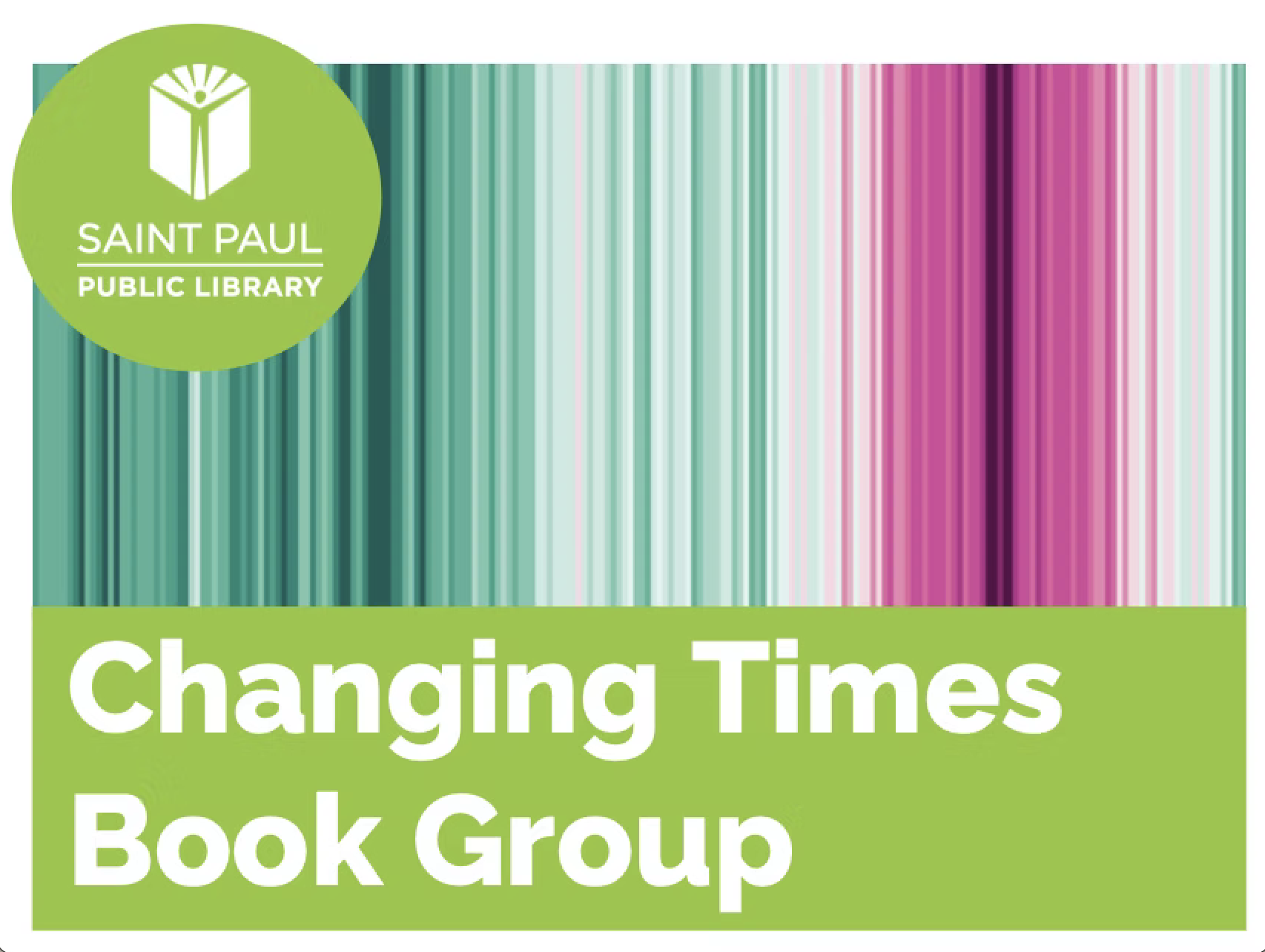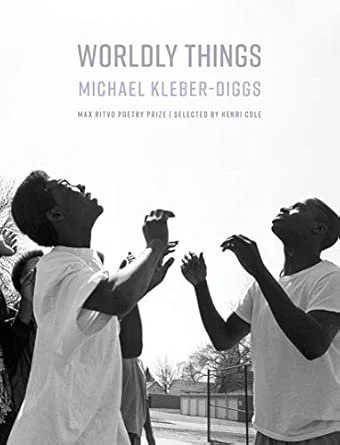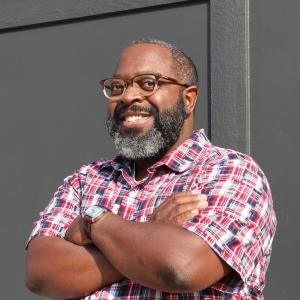Changing Times Book Group
As we face a climate-altered future together, it helps to read together. Changing Times Book Group is a reading group open to all, one title at at time. We focus on climate, social, and environmental justice themes: nonfiction, fiction and memoir. We meet in odd-numbered months on fourth Saturdays. Thanks to the St. Paul Public Library system for its partnership.
Current book selection: March 2026
Worldly Things, poems by Michael Kleber-Diggs
When: Saturday, March 28, 2026 3:00–4:30 pm
Where: St. Anthony Park Branch Library, 2245 Como Avenue, St. Paul
Michael Kleber-Diggs will read some of his poems and lead us in a discussion and Q&A around his journey as a poet and his work with the Minnesota Prison Writers Workshop. We will explore how poetry can serve as a vehicle for change and a deeper understanding of social justice.
About the author: Michael Kleber-Diggs was born and raised in Kansas and now lives in St. Paul. His work has been published widely and his first collection, Worldly Things, was honored with the Max Ritvo Poetry Prize. He teaches poetry and creative nonfiction through the Minnesota Prison Writers Workshop.
Past book selections
In Ceremony, a classic of Native American literature, a World War II veteran of mixed ancestry returns to his reservation deeply scarred, finding peace by immersing himself in his Indigenous heritage. About the author: Leslie Marmon Silko is of Laguna Pueblo descent. Her many books include Storyteller, Gardens in the Dunes, and Almanac of the Dead.
Core Samples is a first-person witness to how science is done, discussed, legislated, and imagined in our nation. With humor and hard-won wisdom, author Anna Farro Henderson reveals the messy humanity of our scientific and political institutions. As a scientist and as policy advisor to Minnesota Senator Al Franken and Governor Mark Dayton, she explores the flaws in those institutions and shows how each crack invites us to creativity and change.
In The Message, one of our the most important writers reveals our urgent task: to untangle ourselves from the destructive myths that shape our world—and our own souls—and embrace the liberating power of even the most difficult truths. About the author: Ta-Nehisi Coates is the author of the bestselling Between the World and Me, a finalist for the National Book Award. A MacArthur "Genius Grant" fellow, Coates is also a journalist, winner of the National Magazine Award and the George Polk Award for his Atlantic cover story "The Case for Reparations."
A modern classic of science fiction, Kindred is the story of a contemporary Black woman who is abruptly transported from her home in California to the antebellum South. Her story unfolds in two time frames as she is drawn back repeatedly to the slave quarters. About the author: Octavia Butler was the winner of a MacArthur "Genius" grant as well as the Hugo and Nebula awards. She is author of The Parable of the Sower and other influential novels, blazing a trail for writers like Colson Whitehead and Ta-Nehisi Coates.
White Birch, Red Hawthorn is a memoir in twelve essays, each dedicated to a tree significant to Minnesota. Nora Murphy tells the story of a maple grove that was home to Dakota, Ojibwe, and Ho-Chunk people long before her own ancestors arrived here. She traces her own education as she learns that ongoing history. About the author: A fifth-generation Irish-Minnesotan, Nora Murphy has partnered with Native communities over many years. She joined us for this discussion. "Nora Murphy displays incredible bravery-- she asks questions and points out the elephant in the room. She creates language to say the things left unsaid." -- Wambdi Wapaha, Sioux Valley Dakota Nation
In The Story of More, Hope Jahren leads us through the key inventions (electric power, cars, large-scale farming) that have eased our lives in the short term while racking up climate costs that are now coming due. How can we respond? In this lively personal narrative, Jahren shows us how. About the author: A Minnesota native and author of the memoir Lab Girl, Hope Jahren is a geobiologist now at the University of Oslo. Nature magazine called her "the voice that science has been waiting for."
The Great Transition is a near-future novel told in the alternating voices of a father and his teen daughter. Several decades from now, the world has been transformed by climate change, but also by human ingenuity. This is a story about families, the world we live in now, and the world we could live in. About the author: Nick Fuller Googins is a writer and elementary school teacher who lives in Maine.
James McBride wrote The Color of Water, his bestselling memoir, as a young man. The son of a black minister and a woman who would not admit she was white, he grew up in the projects of Brooklyn, New York. McBride retraces his own coming of age along with his mother's life story, starting in Poland as a rabbi's daughter, in this page-turning reflection on race and identity. About the author: James McBride is author of The Heaven and Earth Grocery Store, Deacon King Kong, and other celebrated novels and nonfiction books. He is also an accomplished musician.
We're living in an era of deep transition: environmental, social, economic, and political. The Regeneration Handbook offers a path to a new type of activism based on universal patterns of transformation, expansion, wholeness, and balance. Community is key! About the author: Don Hall is training coordinator for the International Transition Network. Don joined us for a discussion. Learn more at evolutionarychange.org.
The Year without Sunshine is a short work of speculative fiction set in a Minneapolis neighborhood in the near future. It shows a community responding creatively to an environmental crisis that clouds the skies and disrupts supply chains. Published online in Uncanny Magazine, it won the 2023 Nebula Award for best novelette. About the author: Based in the Twin Cities, Naomi Krizter writes fiction for all ages. She joined us for this session. Visit her at naomikritzer.com.
The Climate Action Handbook is a browsable, visual guide to the climate solutions at hand when we act as individuals, households, and community members. Travel and work, consumer choices and habits, home energy, food and farming: when we change our patterns even slightly, we help shift societal norms. About the author: Heidi Roop, PhD, is director of the U of M Climate Adaptation Partnership.
In The Hidden Life of Trees, Peter Wohlleben makes the case that the forest is a social network. This book illuminates the processes of life, death and regeneration that characterize woodlands all over the world-- and the challenges urban trees are up against. About the author: Peter Wohlleben is a German forester whose books have transformed the way people view trees and forests.
The Sentence is a novel that asks what we owe to the living and the dead. A tiny Minneapolis bookstore is haunted in 2020 by the ghost of a recent customer. Tookie, now working there after years of incarceration, must solve this mystery during a year of grief, isolation, and racial reckoning in the Cities and the nation. About the author: Louise Erdrich is the Pulitzer-winning author of many books. An enrolled member of the Turtle Mountain band of Chippewa, she runs Birchbark Books in Minneapolis.
Blending history, journalism, and memoir, Rez Life is a nonfiction view of Native American reservation life, especially in Minnesota and Wisconsin, the home ground of Ojibwe writer David Treuer. With vivid characters, the book spans past and present— and recent movements to preserve language and culture. About the author: Author of The Heartbeat of Wounded Knee, Treuer divides his time between the Leech Lake reservation and Los Angeles.
A Half-Built Garden is science fiction that extrapolates from our climate emergency. In 2083, a young scientist stumbles upon alien arrivals who have crossed the galaxy to save humanity, aiming to convince them to leave their ecologically ravaged home and join them among the stars. But some earthlings have already begun to save their planet, forming watershed networks to heal ecosystems and communities. Should they stay or should they go? About the author: Fiction writer Ruthanna Emrys lives in the Washington DC area.
From What Is to What If is a call to action to reclaim our collective imagination. Shrinking our carbon footprint and building happier communities are two sides of the same coin, says author Rob Hopkins. Subtitled Unleashing the Power of Imagination to Create the Future We Want, the book is told through the stories of people and communities around the world who are doing it now and witnessing rapid, dramatic change. About the author: Rob Hopkins is widely regarded as the founder of the Transition movement. He lives in Totnes, England.
Watershed: Attending to Body and Earth in Distress, winner of a MN Book Award for memoir/creative nonfiction, explores the parallels between the health of our bodies, communities, and ecosystems. Ranae Hanson reflects on her youth in the Minnesota northwoods where three watersheds meet; climate truths learned from her students in the Twin Cities, many from immigrant families; and the lessons in her own diabetic health crisis. About the author: After 30 years of living in Saint Anthony Park and teaching at Minneapolis College, Ranae Hanson now divides her time between Minnesota and Seattle.
The Seed Keeper, winner of a MN Book Award in the novel category, spans several generations of a Dakhota family. Rosalie Iron Wing returns to her childhood home in the Mankato area, rediscovering her heritage and the ancestors who protected their families, traditions, and a precious cache of seeds through years of hardship. About the author: Diane Wilson is the author of Spirit Car, former executive director of the Native American Food Sovereignty Alliance, and a Mdewakanton descendent.
All We Can Save: Truth, Courage, and Solutions for the Climate Crisis, is an anthology by women climate leaders: scientists, journalists, farmers, lawyers, activists and innovators across generations, geographies, and races. About the editors: Ayana Elizabeth Johnson (left) is a marine biologist and founder of Ocean Lab, a think tank for the future of coastal cities. Katharine K. Wilkinson is an author, strategist, and teacher.


